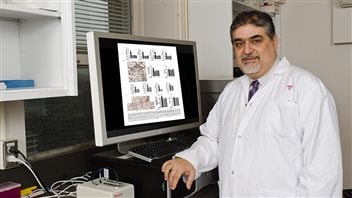DINCH, a compound used to make plastic flexible in toys, medical devices and food packaging may not be as safe as was thought, warns a study from the McGill University Health Centre (MUHC). The research suggests DINCH and its metabolites may interfere with the endocrine system and potentially cause disease.
‘We have to be concerned’
“We have to be concerned,” says Dr. Vassilios Papadopoulos, lead author of the study. “We have to start studying and really focussing on this compound and the whole next generation of these compounds because they are not inert as we thought. They have effects. And at the end of the day we will find out whether really they are safe or not.
“The first indication is it’s not what we thought.”
ListenDINCH effects similar to restricted phthalates’
DINCH was promoted by industry as a safe alternative to other plasticizers called phthalates. They were banned or restricted in children’s products in Canada, the U.S. and many European countries after they were found to affect reproductive health.

Researchers at McGill had used DINCH as a control when they were studying the earlier phthalates, but Papadopoulos says they found DINCH was having effects that were similar to the other compounds.
In this recent study on DINCH, scientists were surprised to find that one of the compounds it gives off could affect metabolism, and they inferred it could possibly interfere with the endocrine system in mammals.
‘People with high exposure could be at risk’
It is difficult to assess whether DINCH exposure does represent a risk to human health, says Papadopoulos, but people who work with the substance and are exposed to high levels could be at risk.
Since humans come in close contact with plastics throughout their lives, Papadopoulos says the effects of plasticizer should be carefully studied.
DINCH is shorthand for 1,2-cyclohexanedicarboxylic acid, diisononyl ester.







For reasons beyond our control, and for an undetermined period of time, our comment section is now closed. However, our social networks remain open to your contributions.